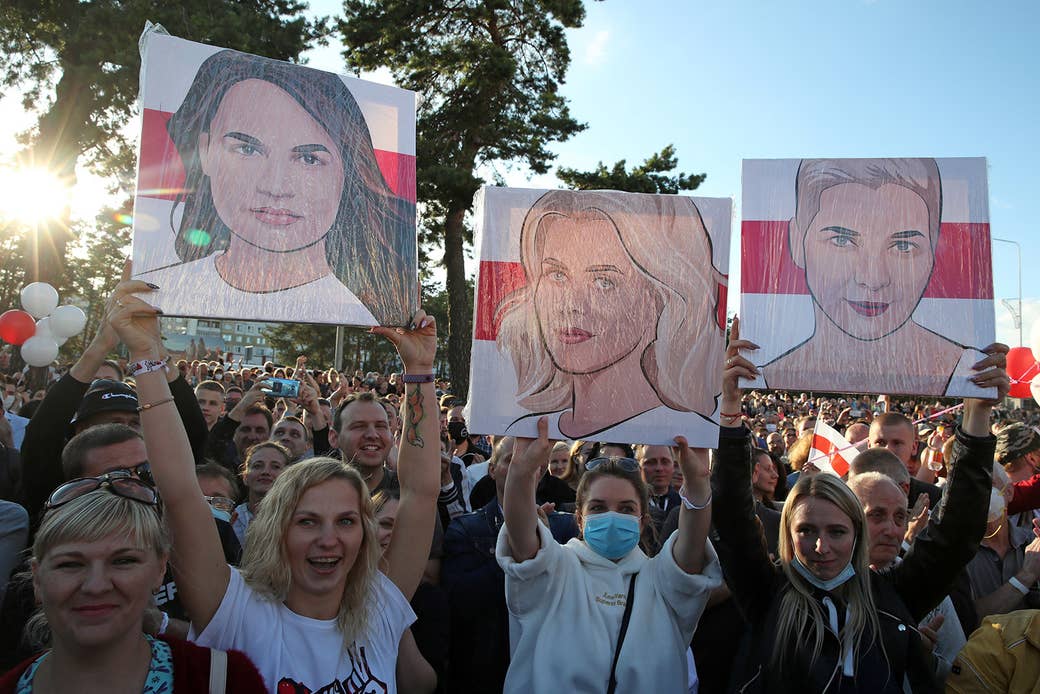
KYIV — Under a setting summer sun recently, 63,000 roaring Belarusians waved flags and held up homemade signs bearing the likeness of a woman who was a total unknown just over a month ago. They chanted her name as she strode in a loose-fitting pantsuit onto the stage at Minsk’s Park of Peoples’ Friendship: “Sveta! Sveta! Sveta!”
Sveta is a 37-year-old former English teacher Svetlana Tikhanovskaya. And in just a matter of weeks, she has gone from obscurity and, as she put it to demonstrators, frying cutlets for her children to a household name and the biggest political threat to Belarusian President Alexander Lukashenko, famously dubbed by the West as “Europe’s last dictator,” since he came to power in 1994.
It is an extraordinary rise that has already earned her the label of Belarus’s “Joan of Arc.”
Just as remarkable considering the patriarchal system in place in Belarus and Lukashenko’s comments about how a woman president “would collapse, poor thing,” Tikhanovskaya is campaigning alongside two other women political novices, Maria Kolesnikova and Veronika Tsepkalo, who serve as campaign advisers and hype the crowd from the stage.
Together, the female troika has captured the imagination of frustrated Belarusians with a promise of change and three simple hand gestures that have become symbols of hope for many in the country: ✌️✊❤️.

“The Belarusian people woke up,” Tsepkalo told BuzzFeed News by phone from Minsk on Friday. “We were sleeping for 26 years and now we are ready for changes.”
Belarus historically has been heavily dependent on Russia but has taken recent steps to normalize bilateral relations with the US after more than a decade of friction.
Lukashenko seems unlikely to lose Sunday’s election because of his control over the government and authoritarian tactics, but the US is watching with a keen eye to see how his government conducts itself in the days running up to the voting and when the ballots are counted. Tactics so far have fit a pattern of intimidation and harassment.
Secretary of State Mike Pompeo visited Minsk in February, the most senior US official to do so in more than two decades. And President Donald Trump has nominated career foreign service officer Julie Fisher to be the first US ambassador to Belarus since the last one was expelled in 2008. Fisher’s nomination moved forward on Wednesday, when she faced questioning from the Senate Foreign Relations Committee.
“The first component to ensuring that we can continue to grow this relationship is to not see steps backward in the conduct of this presidential election,” Fisher said of the US and Belarus during the hearing.
Lukashenko, a mustachioed 65-year-old former Soviet collective farm director who loves a good publicity stunt — whether it’s playing ice hockey with Russian President Vladimir Putin, swinging scythes with French actor Gérard Depardieu, or feeding carrots and watermelon to Steven Seagal — has ruled Belarus with an iron fist for 26 years.
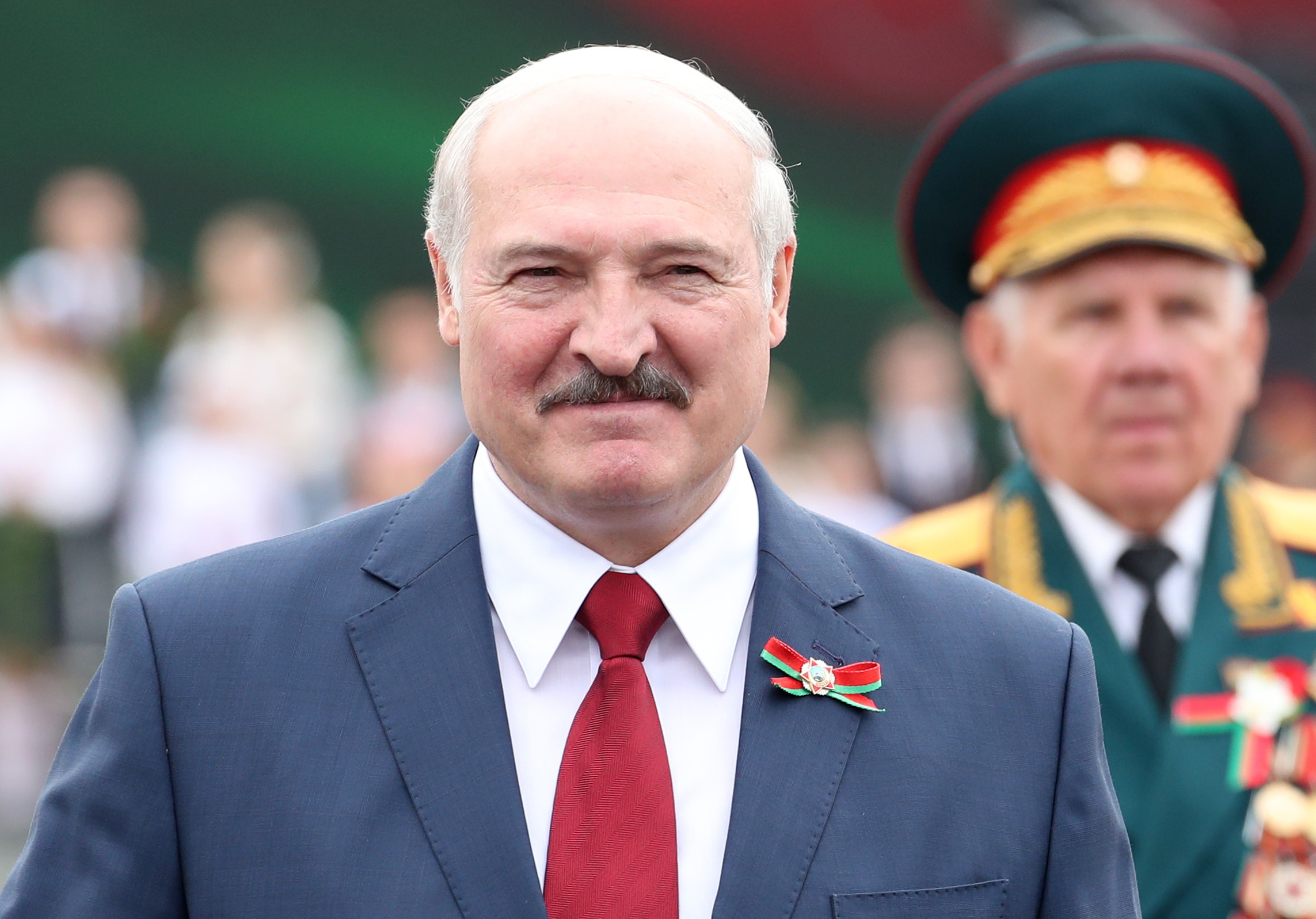
In that time, the man once affectionately referred to by supporters as Batka, meaning “father,” has consolidated power through widespread repression, the expansion of his authority as president, and the systematic dismantling of the country’s democratic institutions.
He has won five presidential elections, although all but the first failed to meet democratic standards and involved widespread vote-rigging, according to international election monitors.
Now Lukashenko wants a sixth term as president — and, using familiar tactics, he will almost certainly win again. His KGB security service has been busy detaining more than 1,300 people considered to be opponents of the president, including journalists, election monitors, and American citizens, according to the Viasna human rights group.
He has ordered snap military drills and visited with anti-riot police, telling them that they “must not allow” street protests. And in a desperate plea for support, he warned an audience of government officials and lawmakers on Tuesday not to “betray” him.
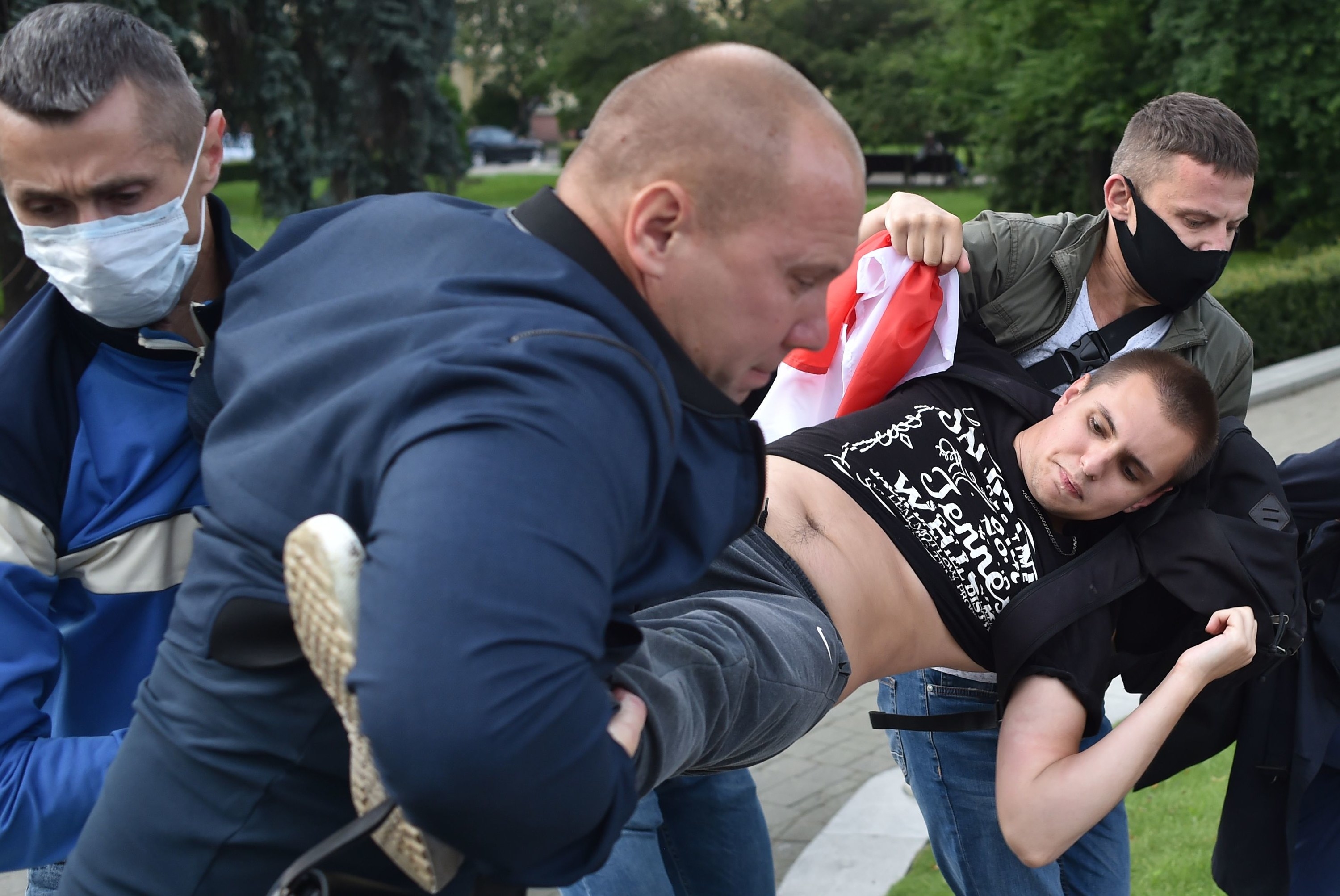
“He’s preparing for a mass falsification of the election,” Valery Tsepkalo, a former Belarus ambassador to the US and the founder of Minsk’s High Tech Park, told BuzzFeed News in Kyiv.
He is the husband of Veronika Tsepkalo and was one of several figures who applied to challenge Lukashenko in the election. But he was banned from doing so. Fearing arrest, he fled to Moscow with his children before coming to the Ukrainian capital.
Veronika Tsepkalo said authorities had started the procedure to remove the couple’s children from their custody, even calling their school to notify it of the move. “If they see you as a threat, they go after you,” Tsepkalo said of Lukashenko’s obedient security forces.
The heavy-handed tactics are being employed by Lukashenko, her husband said, because the president is backed into a corner. “He’s really alone now,” he said.
Indeed, Lukashenko is facing an unprecedented groundswell of criticism from Belarusians over egregious human rights abuses, a stagnant economy that hasn’t improved since 2010, and his failure to respond to the coronavirus pandemic, which has ripped through the population of 9.5 million.
Many Belarusians are especially angry over the president’s mismanagement of the pandemic. Authorities have refused to implement health measures to stem the spread of the coronavirus while Lukashenko himself has dismissed it as a “psychosis” and argued that merely drinking vodka, playing ice hockey, going to the sauna, and riding tractors through fields would stave it off.
Making matters worse, he publicly berated people who became infected with the virus. And then he announced last week that he had contracted it himself but had survived it without experiencing symptoms and remained “on his feet.”
Yuri Tsarik, head of the Russia studies program at the Center for Strategic and Foreign Policy Studies in Minsk, told BuzzFeed News that Lukashenko made a huge mistake when he “positioned himself as a COVID denier” and made disrespectful comments about people who had contracted it before he did.
“I think it was him losing touch with reality,” Tsarik said.
Belarus had reported 68,503 cases of COVID-19, including 580 deaths, as of Friday.
All of this suggests that winning won’t be so easy for Lukashenko this time around and he will likely face staunch opposition long after the election.
Franak Viacorka, an independent Belarusian journalist, told BuzzFeed News that people are desperately seeking an alternative to Lukashenko, especially Belarus’s progressive, democratic-minded youth, who have lived under the ironfisted rule of him for all or most of their lives.
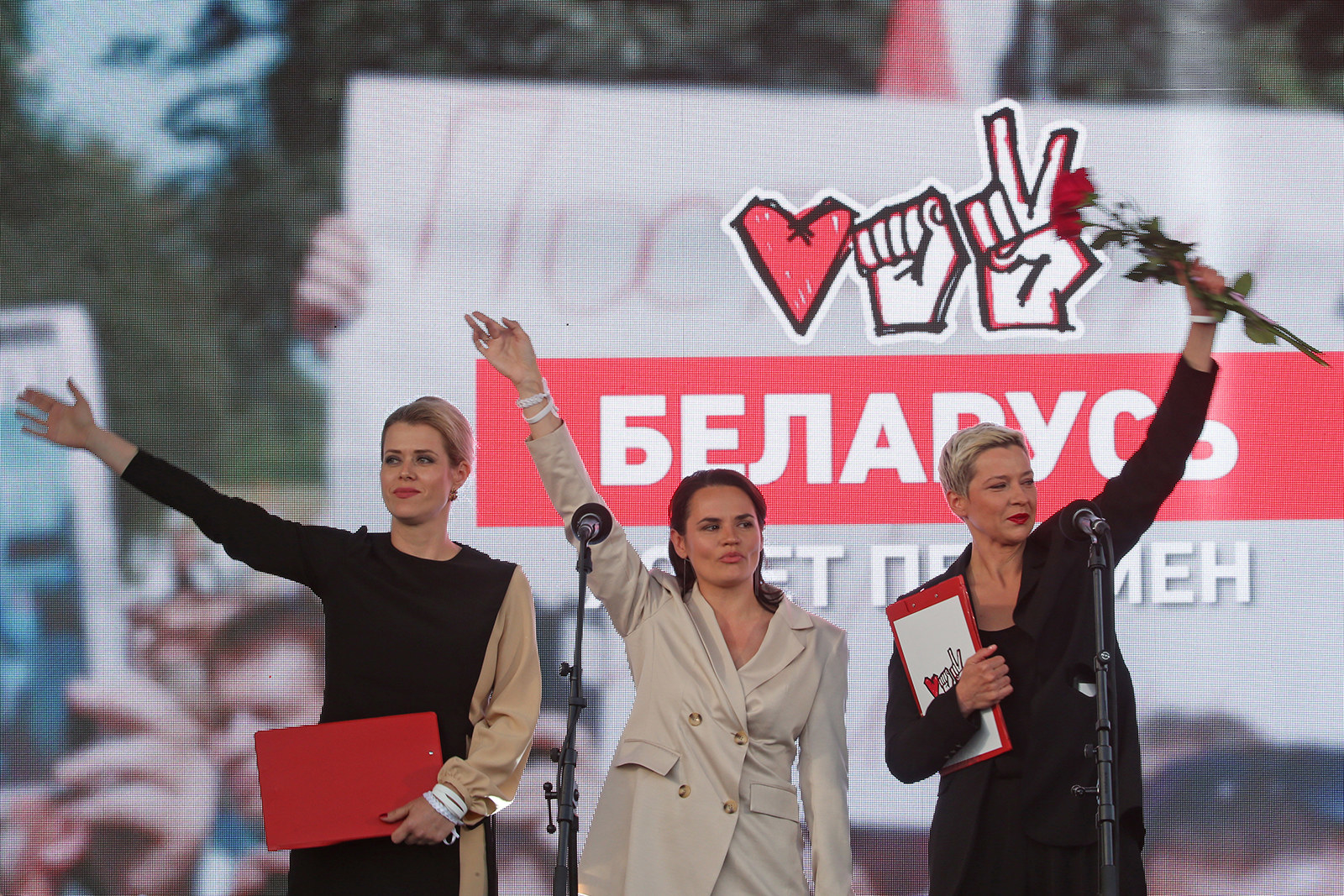
The attraction of Tikhanovskaya, Viacorka said, is that she “is the opposite of Lukashenko.”
“She is educated, gentle, honest,” while the incumbent president is a “brutal, old school Soviet man,” he added.
Those qualities have made an impression, rousing tens of thousands of Belarusians to come out to her rallies in cities and towns across the country on an almost daily basis for weeks despite the threat of detention.
Independent journalist Hanna Liubakova told BuzzFeed News that such massive rallies taking place outside of Minsk represent a major difference from past anti-Lukashenko protests that have generally occurred in the Belarusian capital.
“Even people who voted for him before are saying, ‘We might have voted for him, but he hasn’t fulfilled his promises,’” she said.
Liubakova said the rallies themselves also feel different. Instead of the typical political demonstrations of old, with “boring political speeches” they feel more “like a rock concert.”
And in some ways they are. The unofficial anthem of Tikhanovskaya’s campaign is “Changes” — a song made popular by Russian rock star Viktor Tsoi during Perestroika. At every rally, the presidential hopeful and her two sidekicks pump up the crowd with it. They have also laid it over a slickly produced campaign video.
This sort of grassroots movement was unimaginable before Tikhanovskaya reluctantly stepped into the political arena after her husband, the popular vlogger and would-be presidential candidate Sergei Tikhonovsky, was barred from running, arrested, and jailed by authorities in May.
Liubakova observed that Svetlana Tikhanovskaya can appear awkward on stage, smiling nervously and speaking in a shaky voice, asking supporters to “forgive her mistakes.” But, Liubakova said, those traits help make her relatable.
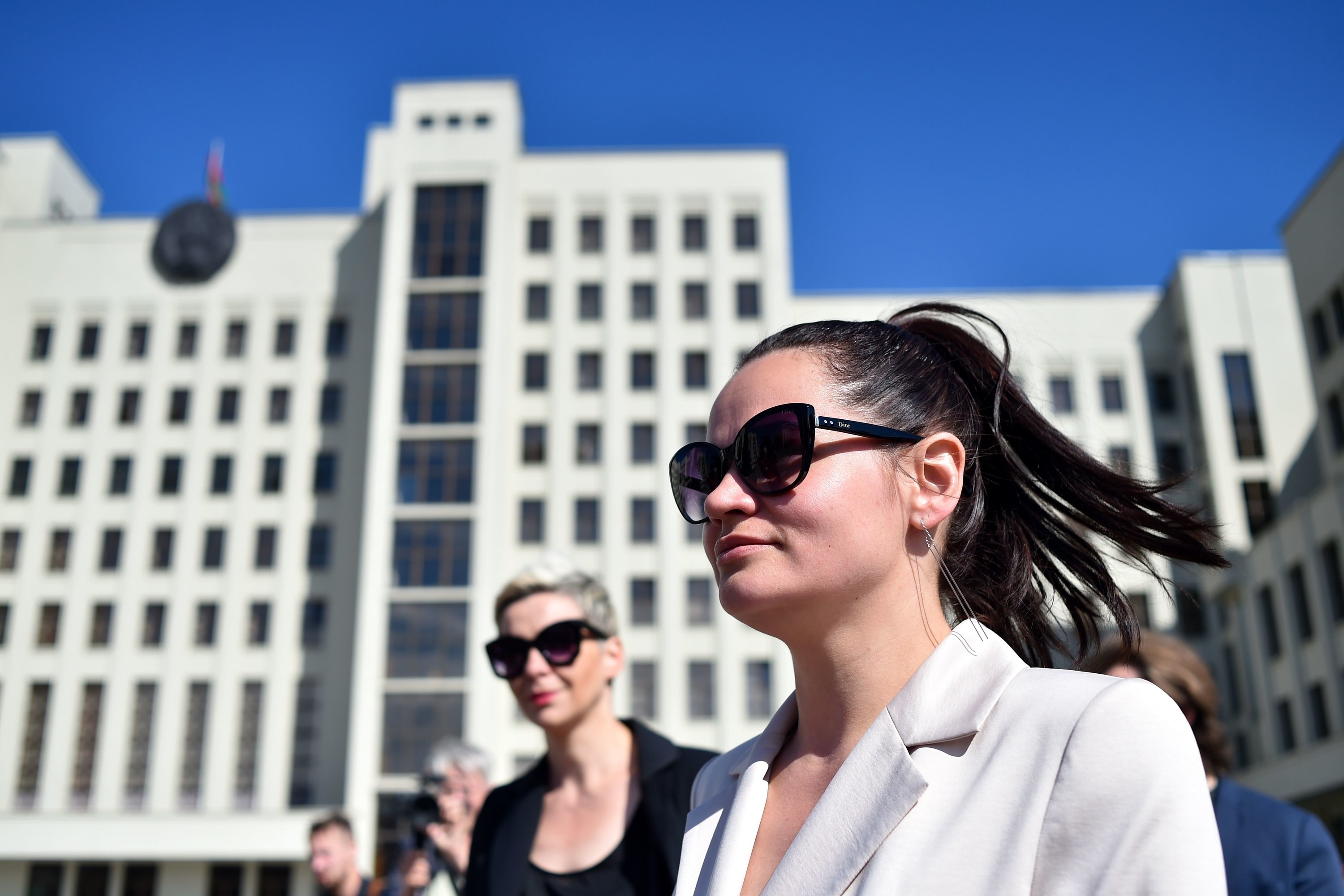
Tikhanovskaya hasn’t grown this movement on her own. Major roles have been played by Kolesnikova, who ran the campaign of Viktor Babariko, a banker and presidential hopeful, before he was also arrested and jailed, and Tsepkalo.
The trio joined forces last month after hashing out a campaign platform in just 15 minutes and deciding that Tikhanovskaya would be the one to register as a candidate.
Their campaign is built on three pillars: to free all political prisoners, overturn authoritarian changes to the constitution made in 1996, and to organize new, fair presidential elections within six months.
“I am not seeking power. I want my husband and children back, and to fry my cutlets,” Tikhanovskaya told a crowd recently to uproarious applause.
It’s hard to know for sure just how popular she and Lukashenko actually are among the population, as there is no independent polling in Belarus.
But some independent Belarusian media, including leading online news sites Tut.by and Onliner.by, published informal polls that showed the incumbent authoritarian with a measly 3% of support. That led to a meme calling the president “Sasha 3%” (Sasha is short for Alexander) that spread on social media. After that, authorities barred the media from publishing any more public surveys.
But it might be enough to simply look to the streets to see who Belarusians support. With their flashy and innovative campaign, Tikhanovskaya and her women partners have managed to organize the biggest public rallies Belarus has seen since becoming independent in 1991.
“We are all joined together in solidarity,” Tsepkalo said. “Now, we wake up every day and wonder, ‘Will we be put in jail today or not?’”
“We want to raise our kids in a free Belarus,” she added.
On Thursday, afraid that Tikhanovskaya would again assemble a rally of tens of thousands of supporters in Minsk just three days before the big vote, the government announced that the location where their last planned demonstration was set to take place had already been booked for a concert in honor of Railway Troops Day, a holiday that Tsepkalo said has never been celebrated before.
Undeterred, Tikhanovskaya, Kolesnikova, and Tsepkalo made a snap decision: They announced in a video shared on social media that they would attend the government-approved concert.
“We will be there. We will be together,” Tsepkalo said.
Within moments of their arrival and as a crowd of their supporters cheered, two DJs controlling the music for the government-approved concert defied the authorities and played “Changes,” the women’s unofficial campaign song. Blaring from the speakers came Soviet-era rocker Tsoi’s famous lines:
Our hearts are longing for changes
Our eyes are longing for changes
It’s in our laugh and in our tears
And it’s pulsing through our veins
Changes, we are longing for changes
Police dragged the two men away but not before they thrust their hands into the air, forming a fist and a V for victory.
On Friday afternoon, a Minsk court sentenced the two men to 10 days in jail. ●
